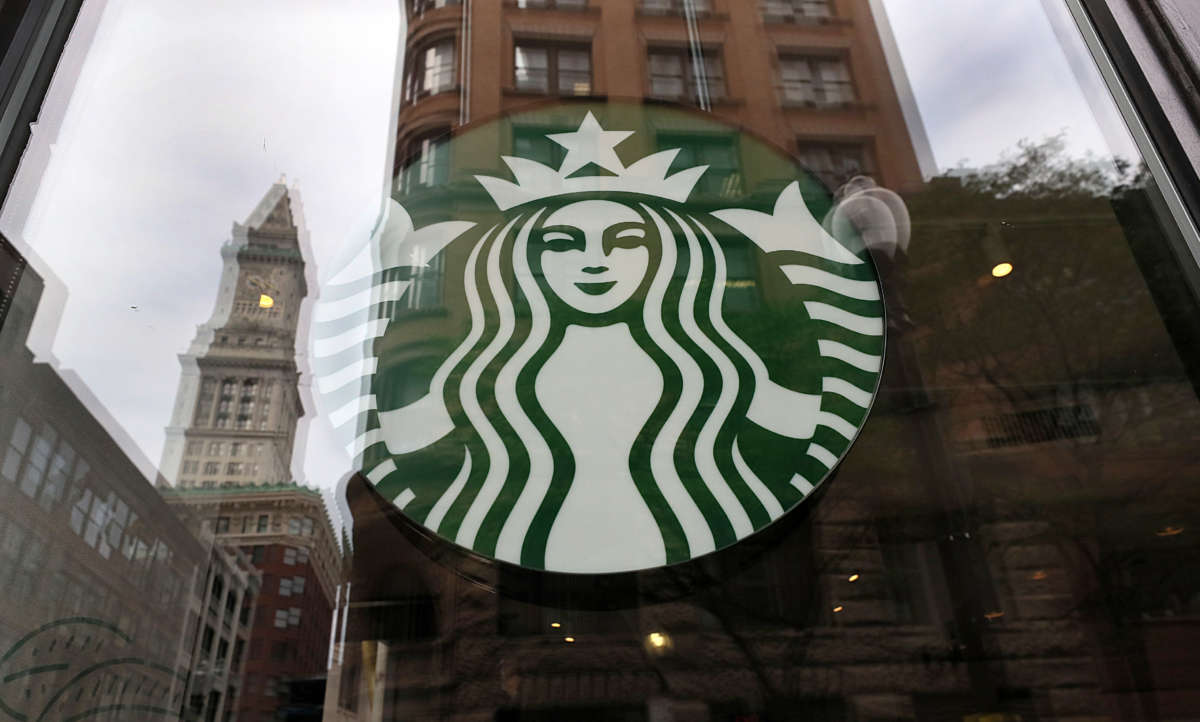Following last week’s historic win in Buffalo, in which Starbucks workers formed the first-ever union within the company, Starbucks workers at two locations in the Boston area have filed petitions to unionize. If they’re successful, they’ll join Buffalo workers in being the first of the company’s roughly 9,000 corporate-owned locations to form a union.
Workers filed on Monday to request union votes for locations in Boston and Brookline, a town in the Boston metropolitan area. They would be joining Workers United, an affiliate of the Service Employees International Union — the same union that workers in Buffalo have now joined.
The filing comes just days after Starbucks employees — or partners, as the company refers to them — at Buffalo, New York’s Elmwood location voted overwhelmingly in favor of the union, 19 to 8. They had faced monumental odds, with the company waging a fierce anti-union campaign.
Another location in Buffalo, Genesee Street, is waiting for its union election results to be certified by the National Labor Relations Board (NLRB). However, the union was ahead 15 to 9 as of the initial count. The agency is currently reviewing seven challenged ballots.
The Massachusetts workers are joining four other Starbucks locations that are currently waging a union campaign: Three additional locations in Buffalo and one location in Arizona have filed for unionization with Workers United. The Massachusetts filing is a sign that, as labor leaders have predicted, Buffalo workers’ successful unionization effort is inspiring workers at Starbucks and even independent coffee shops to begin similar efforts.
In a letter to Kevin Johnson, CEO of Starbucks, the Boston-area workers expressed a feeling of solidarity with Buffalo Starbucks organizers.
“Like the partners in Buffalo, Arizona, and beyond, we believe that there can be no true partnership without power-sharing and accountability,” the workers wrote. “We are organizing a union in Boston because we believe that this is the best way to contribute meaningfully to our partnership with the company.”
In the letter, the workers appeal to the company’s mission, saying that Starbucks should live up to its own stated values and allow workers to assert power and unity in the workplace. “Starbucks’ mission is improving communities one coffee at a time,” they write. “Respecting partners’ right to organize will help us help the company accomplish this mission, by improving our lives and raising standards across the industry.”
The letter writers call on Johnson to sign a list of “fair election principles” laid out by the union, largely including requests for Starbucks to step aside and stop interfering with organizers as they work on the union campaign.
The company is unlikely to agree to the principles, as it has taken bold and potentially illegal steps to fight union campaigns. It took familiar union-busting steps that companies like Amazon have deployed, like holding mandatory anti-union meetings and outright telling employees to vote no.
The company also sent multiple executives and former CEO Howard Schultz to Buffalo to surveil workers and potentially discourage them from voting for unionization. The company closed stores so that workers could attend a bizarre talk by Schultz in which, according to a video of the speech reviewed by Vice, he implied that the $139 billion corporation was similar to victims of the Holocaust. Executives, meanwhile, went to unionizing stores to intimidate workers while obfuscating their roles with the company.
With the first round of union elections done, the company has now moved its anti-union tactics to the next set of locations attempting to organize. The union says that the company has been purposely scheduling pro-union workers erratically at Depew, one of the Buffalo locations that is attempting to unionize. This has a destabilizing effect on workers who are forced to work unpredictable hours.
It has also been creating unsafe working conditions with overstaffing, which doesn’t allow workers to socially distance, and sending representatives from the company to surveil the store at all operational hours.
“Starbucks is purposefully scheduling pro-union partners at inconsistent hours. They are often scheduled both open and close shifts in the same week,” Starbucks Workers United wrote. “This type of scheduling disrupts our ability to have a regular sleep schedule and hurts our mental health.”
Even after the Elmwood location’s votes to unionize were officially counted by the NLRB, the company continued its anti-union messaging. “I am saddened that in the end the majority of you decided it was best for Workers United to represent you,” a Starbucks district manager wrote to Elmwood union members, claiming that the union was “divisive.”
The unionization, however, seems to have united the local community in excitement; customers have been energized and supportive of the unionized workers, sending digital tips and congratulatory notes to the store, workers said.
“Customers are excited. Many of them are new to Starbucks and tell me they are only here because we are now union. One of these leaves a $20 tip,” wrote Jaz Brisack, a worker at Elmwood.
Join us in defending the truth before it’s too late
The future of independent journalism is uncertain, and the consequences of losing it are too grave to ignore. To ensure Truthout remains safe, strong, and free, we need to raise $50,000 in the next 10 days. Every dollar raised goes directly toward the costs of producing news you can trust.
Please give what you can — because by supporting us with a tax-deductible donation, you’re not just preserving a source of news, you’re helping to safeguard what’s left of our democracy.
